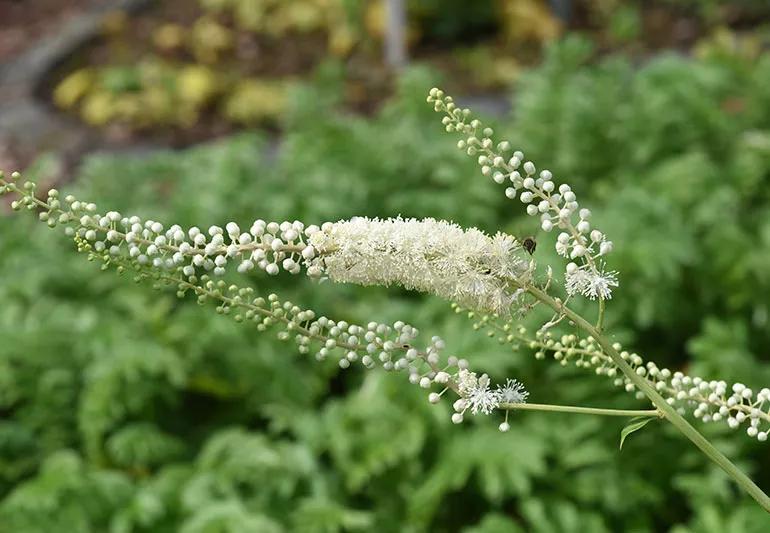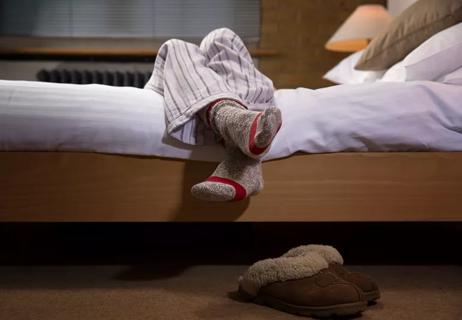This ancient herbal supplement isn’t just a recent trend

If menopause has you all hot and bothered, you may have heard that taking black cohosh can help reduce vasomotor symptoms (more commonly known as hot flashes and night sweats). This herbal supplement has been used since ancient times, but only recently has it come to be known as a possible combatant of this common and uncomfortable symptom of menopause.
Advertisement
Cleveland Clinic is a non-profit academic medical center. Advertising on our site helps support our mission. We do not endorse non-Cleveland Clinic products or services. Policy
Integrative medicine specialist Yufang Lin, MD, explains what black cohosh is, how it’s used and what it can — and can’t — do for your menopause.
Black cohosh (scientifically known as actaea racemosa or cimicifuga racemosa) is a flowering perennial plant with fragrant white blooms on a stem, forming a spike-like structure of up to 5 feet tall. A member of the buttercup family, it grows in the woodlands of the eastern United States and Canada.
Black cohosh goes by other names, too:
Studies show that black cohosh binds to your body’s opioid receptors, giving it a painkilling effect. Today, it’s sometimes used to reduce the muscle aches and body pains associated with menopause, perimenopause and postmenopause.
But while you may think it’s a new trend in wellness circles, it has actually been used since ancient times by healers and medical practitioners all over the world.
“In recent years, black cohosh has been touted as a treatment for hot flashes, but this is not the way it has been traditionally used,” Dr. Lin says. “Both traditional Chinese medicine and Western herbal tradition have long used black cohosh to reduce pain and calm the nervous system.”
Advertisement
Traditional Chinese medicine has turned to black cohosh to:
Western herbal tradition uses black cohosh in similar ways, specifically to reduce pain associated with:
North American Indigenous peoples have also long used black cohosh to treat the pain associated with periods, childbirth and menopause symptoms. And in the 20th century, some physicians began using black cohosh for pain associated with gynecological disorders.
Today, the roots and underground stems of black cohosh are turned into herbal supplements — in the form of capsules, powders and teas — and marketed as a way to reduce hot flashes.
Hot flashes, which are due in part to estrogen withdrawal, are the most common complaint during menopause, impacting up to 80% of women. Symptoms can range from mild to severe and include:
But can black cohosh actually help get rid of hot flashes? Researchers aren’t convinced. “The application of black cohosh for hot flashes is relatively new to the 20th century, but research as a whole has not been supportive of this use,” Dr. Lin says.
One of the phytochemicals in black cohosh has a serotonin-like effect, which may impact your body’s ability to regulate temperature and ultimately help to reduce hot flashes — but it’s not a sure thing. “Not all black cohosh plants express the gene-encoding enzyme required to make this phytochemical,” Dr. Lin explains.
One study found no significant difference between participants who took black cohosh and those who took a placebo.
Hot flashes aren’t the only unpleasant aspect of menopause and perimenopause — but the good news is that black cohosh may help reduce some of those other symptoms, including:
“Black cohosh is an excellent herb to support those experiencing menopausal symptoms — just not consistently for hot flashes,” Dr. Lin says.
“Black cohosh is generally safe when taken appropriately, but there are some people who should avoid it or use it very carefully,” Dr. Lin says.
Side effects of black cohosh are uncommon but may include:
Cases of liver failure have been reported following the use of black cohosh, though researchers aren’t sure whether that’s actually a result of the supplement. “Still, if you have liver disease, you should stay away from black cohosh or use it with caution and have your liver function periodically monitored,” Dr. Lin advises.
Advertisement
Don't use black cohosh if you're pregnant or breastfeeding, due to its impact on the hormones.
The standard black cohosh dosage is 40 mg to 128 mg of extract daily for up to 12 months. “The most common preparations are tinctures and capsules, but motivated individuals can make their own,” Dr. Lin says. To brew it at home:
To ensure that you’re buying a safe, quality product, Dr. Lin recommends purchasing only organic black cohosh from reputable companies that have been independently verified by a third party such as ConsumerLab, U.S. Pharmacopeia or NSF International.
Advertisement
Learn more about our editorial process.
Advertisement

Estrogen loss contributes to bone loss, which significantly raises your risk of osteopenia and osteoporosis

Making certain changes to your diet, sleep habits and even your wardrobe may help lessen the impact of menopause symptoms

A women’s health specialist explains those cold flashes that come on quickly

Changing hormone levels can bring issues like brittle nails, indigestion, dry skin and new allergies (to name a few!)

The choices you make at mealtime could reduce hot flashes or make them worse

If you’ve noticed changes in your mood and mental health while going through menopause, you’re not alone

Missed periods, heavy periods, painful sex and frequent hot flashes are just a few symptoms worth discussing with your provider

At-home tests measure FSH levels in urine, but they can’t actually diagnose menopause

The tropical fruit is a good source of antioxidants and vitamin C

Most people fall asleep within 10 to 20 minutes, but if your experience is different, adjusting your sleep schedule may help

Exploring your hidden side can lead to better understanding of what makes you tick